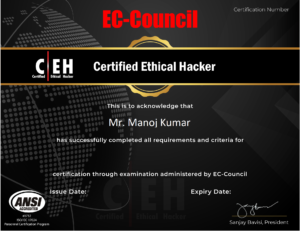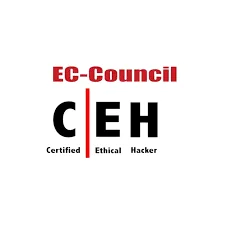
in association with

One Program. Many Benefits
Become
EC-Council Certified
Ethical Hacker
(CEH v12)
“World’s No. 1 Ethical Hacking Certification”

Beat the Hackers at their own game
Learn the fundamentals of ethical hacking, information security controls, standard procedures, and the latest techniques and tools with EC-Council's Certified Ethical Hacker (C|EH) Elite training plan.
Get a FREE Hemang Doshi Udemy CEH Course & Set of 6 Mock Tests with Every Registration!
Program Details
Here are the detailed course specifics and information, including comprehensive curriculum details and all relevant details.
20 Modules That Help You Master the Foundations of Ethical Hacking and Prepare to Take the C|EH Certification Exam
Module | Description |
Module 01 | Introduction to Ethical Hacking: Cover the fundamentals of key issues in the information security world, including the basics of ethical hacking, information security controls, relevant laws, and standard procedures. |
Module 02 | Foot Printing and Reconnaissance: Learn how to use the latest techniques and tools to perform foot printing and reconnaissance, a critical pre-attack phase of the ethical hacking process. |
Module 03 | Scanning Networks: Learn different network scanning techniques and countermeasures. |
Module 04 | Enumeration: Learn various enumeration techniques, such as Border Gateway Protocol (BGP) and Network File Sharing (NFS) exploits, and associated countermeasures. |
Module 05 | Vulnerability Analysis: Learn how to identify security loopholes in a target organization’s network, communication infrastructure, and end systems. Different types of vulnerability assessment and vulnerability assessment tools. |
Module 06 | System Hacking: Learn about the various system hacking methodologies—including steganography, steganalysis attacks, and covering tracks—used to discover system and network vulnerabilities. |
Module 07 | Malware Threats: Learn different types of malware (Trojan, virus, worms, etc.), APT and fileless malware, malware analysis procedure, and malware countermeasures. |
Module 08 | Sniffing: Learn about packet-sniffing techniques and how to use them to discover network vulnerabilities, as well as countermeasures to defend against sniffing attacks. |
Module 09 | Social Engineering: Learn social engineering concepts and techniques, including how to identify theft attempts, audit human-level vulnerabilities, and suggest social engineering countermeasures. |
Module 10 | Denial-of-Service: Learn about different Denial of Service (DoS) and Distributed DoS (DDoS) attack techniques, as well as the tools used to audit a target and devise DoS and DDoS countermeasures and protections. |
Module 11 | Session Hijacking: Understand the various session hijacking techniques used to discover network-level session management, authentication, authorization, and cryptographic weaknesses and associated countermeasures. |
Module 12 | Evading IDS, Firewalls, and Honeypots: Get introduced to firewall, intrusion detection system (IDS), and honeypot evasion techniques; the tools used to audit a network perimeter for weaknesses; and countermeasures. |
Module 13 | Hacking Web Servers: Learn about web server attacks, including a comprehensive attack methodology used to audit vulnerabilities in web server infrastructures and countermeasures. |
Module 14 | Hacking Web Applications: Learn about web application attacks, including a comprehensive web application hacking methodology used to audit vulnerabilities in web applications and countermeasures. |
Module 15 | SQL Injection: Learn about SQL injection attacks, evasion techniques, and SQL injection countermeasures. |
Module 16 | Hacking Wireless Networks: Understand different types of wireless technologies, including encryption, threats, hacking methodologies, hacking tools, Wi-Fi security tools, and countermeasures. |
Module 17 | Hacking Mobile Platforms: Learn Mobile platform attack vector, android and iOS hacking, mobile device management, mobile security guidelines, and security tools. |
Module 18 | IoT and OT Hacking: Learn different types of IoT and OT attacks, hacking methodology, hacking tools, and countermeasures. |
Module 19 | Cloud Computing: Learn different cloud computing concepts, such as container technologies and serverless computing, various cloud computing threats, attacks, hacking methodology, and cloud security techniques and tools. |
Module 20 | Cryptography: Learn about encryption algorithms, cryptography tools, Public Key Infrastructure (PKI), email encryption, disk encryption, cryptography attacks, and cryptanalysis tools. |
Certified Ethical Hacker (CEH) Course Schedule
Weekend (Sat-Sun) Batch
- Dates: 21st September, 2024 to 03rd November, 2024
- Time: 10:00 AM to 01:00 PM IST
- Mode: Online
Exam Details | C|EH® (MCQ Exam) | C|EH® (Practical) |
Number of Questions/Practical Challenges | 125 | 20 |
Test Duration | 4 Hours | 6 Hours |
Test Format | Multiple Choice Questions | iLabs Cyber Range |
Test Delivery | ECC EXAM, VUE | – |
Availability | – | Aspen-iLabs |
Exam Prefix | 312-50 (ECC EXAM), 312-50 (VUE) | – |
Passing Score | 60%-80% | 70% |
Upon successful completion of the training and meeting the assessment criteria, candidates will be awarded a certificate, qualifying them to become an EC-Council Certified Ethical Hacker.

Indian Participant: Total Price ₹42,000+GST Enroll Now
International Participant: Please contact us for the price Contact Now
The Above course fee includes:
- Live Online Training (Duration: 40 Hours) per participant.
- Includes access to the official coursebook.
- Covers examination cost.
Get Training Now
Course Overview
The CEH v12 Training Program is widely recognized as the leading credential in ethical hacking, endorsed by employers globally. It is the most sought-after certification in information security, increasingly required by providers of critical infrastructure and essential services. Since its establishment in 2003, CEH has set the standard in the information security field.
The EC-Council CEHv12 provides comprehensive training essential for obtaining Certified Ethical Hacker status. Covering topics such as penetration testing, vulnerability assessment, exploit development, and secure network architecture, participants acquire expertise in identifying and exploiting vulnerabilities across diverse systems. The program emphasizes both theoretical knowledge and practical hands-on exercises to develop robust cybersecurity defense skills.
Why Choose CEH v12 Course?
-
40 hours of live, instructor-led training.
-
Top-notch resources ensuring CEH v12 exam success.
-
Practical training using the latest tools.
-
EC Council CEH Exam Voucher included (Single Attempt).
-
Expert guidance from CEI certified professionals.
-
Technical support throughout the learning journey.

Ready to become Certified Ethical Hacker?
What will you learn
Presented below is the comprehensive course outline, detailing the modules and topics covered
Who Should Participate?
Let’s start the journey towards success and take your career to the next level.
Law enforcement personnel
Individuals transitioning into a career in cybersecurity
Security enthusiasts and hobbyists
Become Certified Ethical Hacker
What are the Career Prospects?
Here are the career prospects you can look forward to after earning EC-Council Certified Ethical Hacker certification:
Frequently Asked Questions
Here, you will find answers to the most frequently asked questions to help you quickly clear all your doubts.
Yes, our platform supports access from laptops, tablets, smartphones, and PCs, ensuring you can reach course materials with an internet connection anywhere, anytime. But Laptop is recommended for better understanding.
Upon enrollment, you will enter an online learning environment where all course materials, including lecture notes, video lessons, and additional resources, are available.
Absolutely! Our courses foster interaction through an online community, providing a dynamic and engaging learning experience.
Those interested in safeguarding their cyber assets can enroll. Signing a non-disclosure agreement ensures ethical use of acquired skills.
While no prior knowledge is required, familiarity with networking basics and Linux OS can be advantageous.
CEH training utilizes the Kali Linux platform, equipped with necessary tools for practical exercises.
Yes, the CEH course emphasizes hands-on practice alongside theoretical knowledge.
While not mandatory, having a degree is beneficial for a career in cybersecurity.
The exam voucher remains valid for one year from the registration date.
Exam results are immediate, with digital certificates available within 7-10 working days.
The CEH certificate remains valid for three years, extendable through participation in EC-Council's continuing education programs.
Yes, you can retake the exam up to five times within a 12-month period by paying an additional fee.
Starting as a penetration tester is advisable, progressing to roles such as security auditor or manager.
Yes, ethical hacking training is legal when conducted ethically and within legal boundaries.
Have Questions?
Chat with out course counsellor
Email: info@techdynamicsacademy.com
Phone: +91 9977745321

























